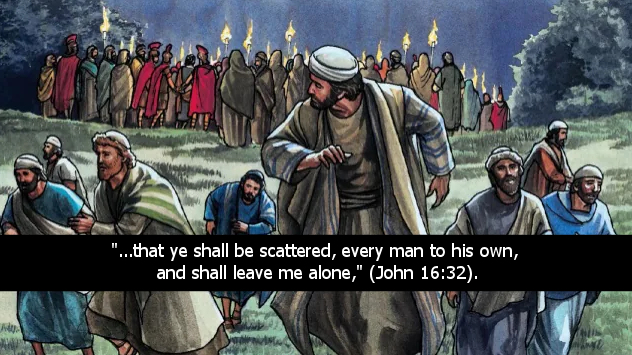“Behold, the hour cometh, yea, is now come, that ye shall be scattered, every man to his own, and shall leave me alone: and yet I am not alone, because the Father is with me,” (John 16:32).
True friends multiply joy as well as lessen misery. Some of Christ’s truest friends on earth were his faithful apostles. But in his time of greatest need, the prophet Isaiah describes the Lord’s experience, “ I have trodden the winepress alone; and of the people there was none with me,” (Isa. 63:3). And in Psalm 69:21, “I looked for some to take pity, but there was none; and for comforters, but I found none.” In his time of extreme human need, Christ’s closest companions actually desert him rather than support him.
How truthfully he could say, “I came to my own, and my own would not receive me.” He came to the Jews, his chosen people, and they accused him of being a glutton, a winebibber, a blasphemer, and even Beelzebub himself (Matt. 11:19). In his own province in Galilee he is disregarded and disesteemed (Matt. 13:55; Mark 6:4). He comes to Jerusalem, whose inhabitants are enlightened by his sermons and amazed by his miracles, and still they break his heart. “O Jerusalem, Jerusalem, how often would I have gathered you… but you would not,” (Matt. 23:37). And that’s not all, for when he is arrested, Jesus is accused of treason against Caesar, sedition against the Law, enmity against the temple, and blasphemy against God. But this is not all.
When you look more closely, you find that many of his own disciples (2 Tim. 4:10) return to the love of this present world. “Many,” the text says in John 6:66, “drew back and walked no more with him.” But will his closest friends leave him too? Before they have said, “Master, to whom should we go? You have the words of eternal life.” And yet, when the sun beats hottest on them, how soon are they all withered. One betrays him, another swears against him, but all forsake him.
What does it mean that his own apostles forsake him? Scripture asks that if the light itself becomes dark, how great is that darkness? If the salt of the world loses its saltiness, how can it be effective? (Matt. 5:13). So if these cedars of Lebanon can become reeds that are shaken with the wind, let him that thinks he stands take heed lest he fall. These “to whom it is given to know the secrets of the kingdom,” (Luke 8:10), these stewards of his mercies who dispense the alms of his bounties, those who promise “never to forsake him,” in this most difficult of times do, indeed, forsake him.
Had he not warned them before of this event, that he would be delivered into the hands of men? (Luke 24:7, John 16:4). Was their faith so strong before as to cast out spirits, and yet they are unable to cast out their own ghosts of fear? “True love” the apostle John says, “casts out fear” (1 John 4:18). And yet when he is praying with such agony that he sweats as it were great drops of blood, they could only sleep. And when he was bound and taken away, they fled the scene in fear.
If God withdrew his hand which keeps this bruised reed from breaking, what would become of me? (Matt. 12:20). Such are these apostles when left to themselves. Peter and John follow him from afar after his arrest. After his death, they are found hiding (John 20:19) for fear of the Jews. After he is risen, they are fearful to meet him. Am I really any stronger than they were?
David is not afraid though ten thousand should hem him in (Ps. 3:6) because the Lord sustains him. But let God even ever so little withdraw his support (Ps. 55), and fearfulness overtakes him and dread overwhelms him. It is clear that this man after God’s own heart has so little heart of his own when left to himself. God sometimes lets us fall so we can clearly see in whose strength we stand. He allows us to see the hand that holds us, to let us know that without him we are but men (Ps. 9:20).
Contemplations:
- O my blessed Lord and Savior, you call all to yourself and say, “Come unto me, all that are heavily laden and I will give you rest,” (Matt. 11:28). And yet must you, Lord, tread the winepress alone, bearing alone the whole burden of your miseries (Isa. 63:3), such that not even one of your apostles shares with you in one wound, stripe, or taunt?
- Blessed Lord, you did not need any of your apostles to help you when it came to saving me from suffering. They ran from life itself, in order to save themselves from a temporal death. Let me never leave your side, but rather help me ever do as they say, “Master, to whom else shall I go, for you have the words of eternal life.”
- Lord, you allowed your own apostles to fall that I might take better heed how I stand. Let me turn, then, your grace into watchfulness (Jude 1:4). If your own parents lose you (Luke 2), your own apostles desert you, how much more should I work out my salvation with fear and trembling (Phil 2:12)? Let their fall serve to raise me from despair when I am down. But let me never take this as an excuse to fall, simply because I may rise again, but rather to stand in your strength that I do not fall.
Further References for John 16:32:
Matthew 26:31, 26:56; John 16:25; Zech. 13:7; cf. Acts 8:1


